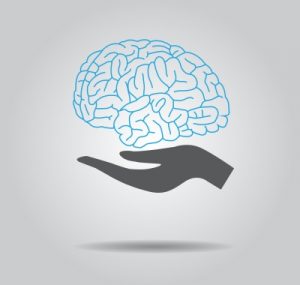“Take Care of your Brain”
Those affected by Multiple Sclerosis know that MS is a disease of the brain, spinal cord and the optic nerves. When MSers think of their brain, most are concerned about the lesions and possible cognitive impairment. Some people are aware that emotions such as depression and mood swings can also be directly affected by the brain.
But I bet most folks don’t think or even know that one can take care of their brain to help manage their MS symptoms and progression. Brain health is a crucial component of one’s overall health and wellness.
As a person who has lived with MS for decades and loves to research, I find myself reading almost daily about the brain. I am equally fascinated both by the tremendous amount of research that has occurred about this complicated organ and what is has been learned about it just in the past few years. More attention and funding for research is occurring such as “The Brain Initiative”, where the National Institutes of Health (NIH) has committed $40 million in the first year to develop better technologies for investigating the brain. The goal, among many, is to map the activity of every neuron and cell in the brain. This week, Arizona State University and Banner Health will team together to form a new brain research lab focused on Alzheimer’s, Parkinson’s and other brain-related diseases.
SO HOW DO YOU TAKE CARE OF YOUR BRAIN?
There are many things that can be done specifically for the brain just like one would do for overall wellness: getting enough good sleep, exercise, diet, stress less, etc. that are listed as main categories below. However, I have included many links to excellent articles from credible sources that expands/explains much more information for your knowledge/interests.
• Sleep: a #1 Priority
Sleep affects EVERYTHING in the body—your heart, energy level, pain, weight, and even skin. Your brain cannot function well without it. It affects your mental state: judgment, reaction times, moods, memory, concentration and decision making. Sleep enables your brain to process information and store it in your memory; it rejuvenates parts of your brain that was used during the day and even parts that are not normally used.
Scientists say sleep is nature’s panacea, more powerful than any drug in its ability to restore and rejuvenate the human brain and body. Studies consistently show that people who sleep less than eight hours a night don’t perform as well on concentration and memory tests. Check out these excellent articles for more detail:
“The Power of Sleep” New research shows a good night’s rest isn’t a luxury–it’s critical for your brain and for your health. Time Magazine 9/11/14
“Why is sleep so important to the immune system?”
Many people with MS have sleep issues, due to a variety of reasons. Here is a blog post of mine that addresses this subject may be helpful “MS and Sleep”
• Exercise your Brain
Quite simply, the brain is similar to a muscle—you use it or lose it.
When I was a little girl, my aunt would always tell me to “use my intelligence” for making decisions, solving problems or looking for an answer to something. I was forced to use logic, common sense, imagination, creativity and social skills. Television was limited, and my mother made me read every night until I started middle school. They were wise and I was gifted because of it. I yearned to learn and am still doing it.
My cognitive function is now beginning to slip a bit—because of age? MS? menopause? Who knows, but I know there are brain exercises and other things that can be done to help keep my mind sharp.
A great place to get started is at the AARP Brain Health and Wellness website, where in addition to forms of solitaire, you can work on your memory, math skills, vocabulary, analytical skills and concentration by playing eight games such as “The Right Word” and “Private Eye.” You can pick your skill level on a sliding scale. Be sure to try the examples. The games are challenging — and addicting.
• Diet – “Brain Food”
Yes—there are foods that are specifically good for the brain. And what is good for the brain is also good for the body.
For example, avocados increase blood flow to the brain, and may help in lowering blood pressure. Deep-water fish, such as salmon, are rich in omega-3 essential fatty acids, which are essential for brain function. Omega-3s also contain anti-inflammatory substances. Beans stabilize glucose (blood sugar) levels, the brain is dependent on glucose for fuel. Freshly-brewed tea can boost brain power by enhancing memory, focus, and mood. Tea also has potent antioxidants, which promotes healthy blood flow. Check out“Eat Smart for a Healthier Brain”, or Google away!
• What is good for your heart is good for your brain**
Taking the following steps to keep your heart healthy may also help stave off cognitive decline:
• Don’t smoke.
• Sleep 7–8 hours a night.
• Keep your blood pressure and cholesterol levels in check.
• Eat a low-fat, healthy diet.
• Get plenty of exercise.
• Maintain a healthy weight.
• Limit alcohol consumption.
• Get blood sugar levels (and diabetes, if you have it) under control.
While scientists have traditionally viewed brain cells as finite resources, they’re now learning that the brain continues regenerating and forming new connections throughout one’s life. Although most cognitive reserve is probably built up early in life, engaging in mentally stimulating activities at any age may have a positive effect—and it doesn’t have any negative side effects.
**Source: “Staying Sharp: What you do during your free time could help save your brain.”
• Stress Less
It doesn’t take a rocket scientist to know that stress affects moods, emotions, concentration and many other parts of the body. Everyone has stress in their lives, but it’s the chronic stress that will really activate an immune system response—something MSers do not want.
This recent article discusses the implications stress can have on the immune system and change brain chemistry. It is definitely worth a read: “From The Brain to the Immune System, How Stress Pirates Your Whole Body”
What de-stresses you? Music? Taking a rest? Talking to a friend? Deep breathing and Yoga? Therapy? Actions to de-stress are critical for your overall wellness, and for managing your MS.
• Drugs/Medications
There is no question that all drugs have side effects and work differently for different people—both on the body and the brain. But folks need to do their homework, ask a lot of questions, and weigh the benefits vs. risks of each drug that is taken—both in the short-term and the long-term. In my opinion,
o YOU are in charge ultimately, not your doctor or anyone else.
o YOU know your body best.
o YOU acquire knowledge about the drugs.
o YOU take responsibility for monitoring what you are taking, keeping notes…
It sounds like common sense, but it is amazing how many people don’t do these things. One woman I counseled with MS was freaking out about losing her cognitive function. During our conversation, I learned she was taking a sleeping pill, anxiety pills, and pain pills every day! Another woman I spoke with last week said her neurologist wanted to start her on a DMT, and she wasn’t definitely diagnosed with MS yet!
The following websites are for further information and interest:
“Common Causes of Brain Fog: How to Deal with Brain and Mental Fatigue”
Brain Health Center (AARP) Lots of cool info about the brain: memory, fitness, diet, sleep…
The Link Between Your Immune System, Brain, and Alzheimer’s
“Are Cognitive Problems Blamed Too Much on MS?”
The brain is the most important part of the body—protect and take care of it!
www.DebbieMS.com
Author/MS Counselor/Living with MS
*Image courtesy of atibodyphoto at FreeDigitalPhotos.net


